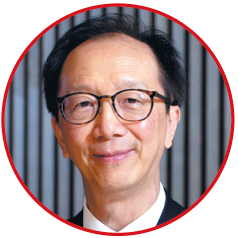
Jan 29, 1952, in Hong Kong
EDUCATION:
1973: Bachelor of social sciences, economics and statistics, University of Hong Kong
1982: Management development program, Harvard Business School
1999: Advanced management program, Harvard Business School
CAREER:
1973-96: Currency trader and regional manager in New York and across Asia, Citigroup
1990-98: Chairman, Hong Kong University Grants Committee
1996-2001: Head of Greater China and the Philippines, Chase Manhattan Bank (now JPMorgan Chase)
1997-2001: Non-official member, Hong Kong Executive Council
1998-2001: Chairman, Hong Kong Education Commission
2000-01: Chairman in Asia-Pacific, JPMorgan Chase
2001-03: Financial secretary, Hong Kong
2007-14: Senior managing director and chairman for Greater China, The Blackstone Group
2014-present: Chairman and CEO, Nan Fung Group
2016-present: Co-founder and chairman, New Frontier Group
The banker who helped build Greater Bay Area

Going against the trend
In 1996, Leung oversaw Citibank's private banking operations across Asia from Singapore.
That was the year before Hong Kong's scheduled return to the motherland. Part of the population was jittery as they did not know what the handover would mean. Some packed up and left, seeking a future elsewhere.
However, Leung chose to stay, though he could have moved on with his career at Citibank.
"Many people were worried about whether the 'one country, two systems' would work, and whether the political transition would be smooth," he said. "I thought if given the chance to participate, I should go for it." Leung left Citibank after 23 years and went to work for Chase Manhattan Bank, which is now known as JPMorgan Chase.
He returned to Hong Kong, the city where he grew up, after his stint in Singapore.
"Looking back, I think it was a good decision, and a good opportunity," he said.
"I was fortunate to have assisted Tung Chee-hwa in his successful bid to become the special administrative region's first chief executive. When he took office, I was asked to join his Executive Council as a non-official member. The council was the SAR's top policy advisory body. I had a chance to make some impact on the city's development."
Money not a priority
By 2001, Hong Kong was still groping its way through a shaky start as a special administrative region. In 1998, just a year after its return to China, Asia was hit by a major financial crisis.
Hong Kong's economy faced serious financial hurdles, and unemployment ran high. Amid the chaos around him, Leung took the biggest risk of his life. He gave up an annual salary at JPMorgan of more than HK$20 million ($2.56 million), and became the Hong Kong SAR's second financial secretary. The salary for that post was around HK$4 million a year.
"The money one man can spend is limited... so money wasn't part of my thinking," Leung told local media at the time. "My consideration was whether I could serve Hong Kong... and make a difference."
Leung became the first cabinet secretary in the new administration without a background in politics or the civil service.
He remembers people saying to him: "It takes a thief to catch a thief." Leung smiled interpreting the comment to mean, "Hong Kong now has somebody with years of solid front line experience in the financial world to manage the other 'thieves'."
Leung brought in bold measures that aided the city's recovery. There were tax increases and sizable cuts to government expenditure.
Among the measures that Leung proposed to Tung was the idea that the city's infrastructure development should include the construction of the Hong Kong-Zhuhai-Macao Bridge and the Guangzhou-Shenzhen-Hong Kong Express Rail Link.
"I told Tung that if we didn't catch up on transport links with the Chinese mainland, Hong Kong would become an 'appendix' to the area. ... He immediately got the idea," Leung said.


